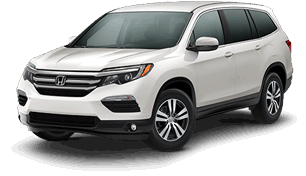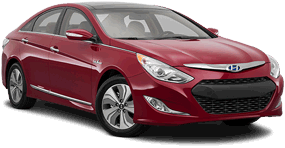The average new car price tag has been on the rise, climbing to over $35,000 last year. Does this mean you'll be forced to shell out this much money for your next car? Thankfully not. While the average price has skyrocketed due to the popularity of larger SUVs and pickup trucks, there are still plenty of affordable vehicle options to choose from across segments. With a little research and common sense, you'll have a good understanding of how much to spend so that you don't overpay for your future car. This guide will help you budget for a new car, get acquainted with dealer pricing terms, and learn how to negotiate the best possible price on a new car.
How to Budget for a New Car

Before we get into the nitty-gritty of how new car pricing works, there's a more pressing question to consider which is "how much car can you actually afford"? There are no hard and fast rules to determine how much you should spend on a new vehicle, but a good rule of thumb is to spend no more than 10-20% of your take-home pay on a vehicle. Sticking to the lower end of this range means you won't have to cut back on your everyday expenses like you would with a higher monthly payment.
Speaking of auto financing, budgeting for a new car includes saving up for the vehicle down payment before making the purchase. A down payment reduces the total amount borrowed, giving you an advantage for auto loan approval and interest rate offers. The recommended down payment for a new car is 20% of the purchase price, so if your new car is $20,000, save up at least $4,000 for a down payment. If you're a first-time car buyer, remember to account for the additional costs of car ownership like insurance, gas, and maintenance which can quickly add up.
New Car Pricing Terms
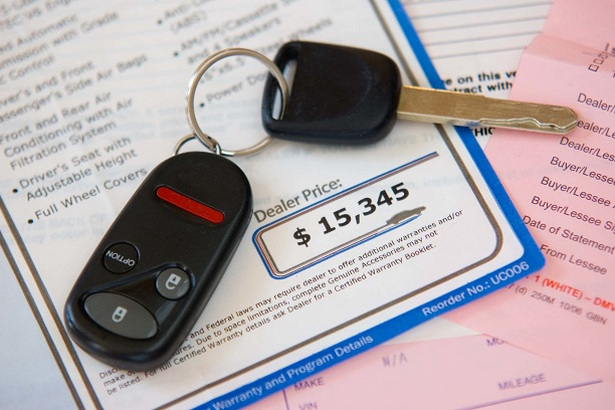
You'll hear a lot of terms thrown around when you're car shopping including base price, MSRP (Manufacturer's Suggested Retail Price), sticker price, market adjustment and dealer-invoice price. You'll also hear some terms that are meant to entice you to buy including dealer sales incentives and rebates. The final category includes all the additional (hidden) fees involved in the purchase. Understanding these terms is important when buying a new car because the price you see in the window will likely not be the final price you'll pay.
Base Price
You'll often see the term Base Price used in car reviews and buying guides. The car's base price is an initial new vehicle price that excludes additional charges like destination fees and options that will drive the price up.
MSRP (Manufacturer's Suggested Retail Price)
As the name indicates, the MSRP is the price the automaker suggests for a particular model. However, new car dealers have the freedom to sell that vehicle at a higher or a lower price than the MSRP. "Total MSRP" or "sticker price" is the base price plus the destination charge and options. High demand for a vehicle can drive the vehicle's price up, and conversely, low demand can drive it down.
Dealer-Invoice Price
The dealer-invoice price is what the automaker charges the dealer for the vehicle. It tells you the price of the car without the dealer markup. This price gives you some sense of what the dealer paid for the vehicle, but it can leave out some incentives and manufacturer refunds that the dealer received. You can ask a salesperson to see the dealer-invoice price if you can not locate it yourself.
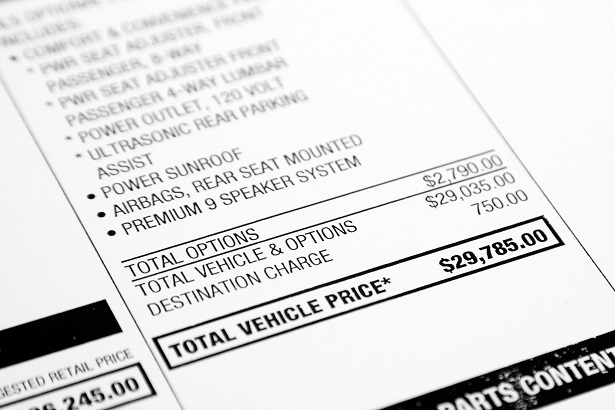
Rebates
You'll hear the term rebate mentioned often in vehicle advertising. A rebate is a discount offered directly from the manufacturer to the car buyer which is used to push sales for a particular model. These discounts usually don't last for a long time and the amount offered can vary based on demand for the vehicle.
Dealer Sales Incentives
Dealer sales incentives are offered to a dealership from the manufacturer. Depending on the demand for a vehicle or dealership promotions, the dealer may choose to pass the savings down to the customer or not. If they do, the savings will usually be available for a short promotional period only.
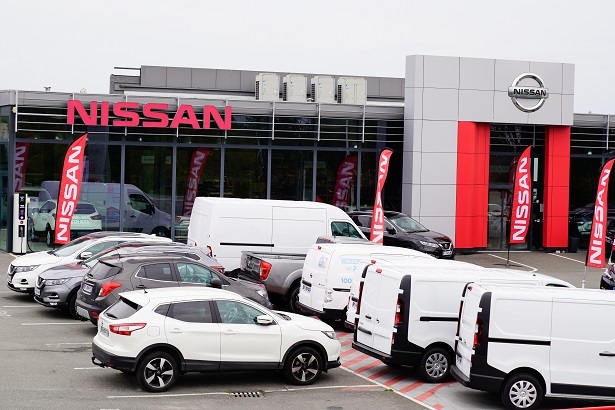
Additional Purchase Fees
Before you drive away in your new car, you'll pay additional dealer fees that many car shoppers overlook prior to the purchase. These include documentation fees, advertising fees and title and registration fees. Documentation fees cover the dealer’s cost of processing the sale. These fees can vary, but anything over $500 should be questioned. Some dealers charge advertising fees, passing along the costs they pay the automaker for advertising resources. These fees should be disclosed to you before you see them in your paperwork and they may be negotiable. Finally, title and registration fees may be charged to register your new vehicle and these fees are non-negotiable.
How to Negotiate the Best Price

After you test-drive a vehicle and decide to buy, you'll sit across the table from your salesperson and talk numbers. Negotiating can be the most stressful part of the car-shopping process. With all the variables that go into the new car pricing, new car prices aren't exactly transparent. It also doesn't help that the salesperson is a professional negotiator while your skills can probably use some work. While we can't promise you'll score an amazing deal by being prepared, you'll at least gain the confidence to hold your ground.
First, start by researching vehicle pricing online and get new car quotes from all the dealerships in your area to use as leverage when you go in to buy the vehicle. When you're negotiating the car's price, make sure you avoid discussing your desired monthly payments. You should negotiate the car price, finance terms, and your trade-in separately. Allowing the salesperson to roll everything up into a monthly payment leaves a gray area that can lead to a higher price.
You should insist on negotiating the lowest possible price on the car first and only after you land on a comfortable number, should you move on to the financing and trade-in. Finally, don't let the salesperson pressure you into signing the contract that day. You can visit another dealership or come back another day if you're not happy with your new car's price or you aren't ready to buy.

